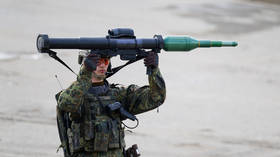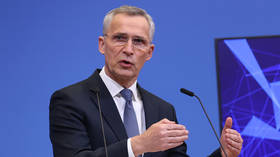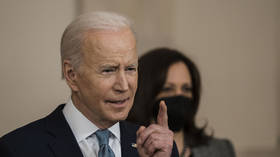Germany makes U-turn on sending weapons to Ukraine

Germany has decided to supply Kiev with 1,000 anti-tank weapon systems as well as 500 ‘Stinger’ surface-to-air missiles from the German Army stocks, a government spokesman, Steffen Hebestreit, announced on Saturday. The weapons are to be delivered to Ukraine “as soon as possible,” he added.
Chancellor Olaf Scholz has commented on the decision by calling the ongoing Russian military operation in Ukraine a “turning point” that “threatens the entire post-war order.” It is Berlin's “duty” to support Ukraine in defense against what he called “Vladimir Putin's invading army.”
Earlier on Saturday, several German media outlets reported that Berlin had changed its position on supplying Ukraine with lethal weapons upon urgent requests from Kiev and its NATO partners.
Germany's ARD broadcaster reported that Berlin plans to provide Kiev with portable anti-tank missile launchers “via third countries.” The German government reportedly struck a deal with the Netherlands that would see Amsterdam handing over the weapons to Ukraine.
Scholz had previously ruled out deliveries of lethal arms to Ukraine. Under the German rules for resale of its weapons to third countries, anyone who resells German-made arms has to request Berlin's approval first. Earlier, Germany removed the need for such requests when it came to Ukraine.
Germany's FAZ newspaper reported on Saturday that Berlin also greenlighted Estonia's plan to hand over self-propelled howitzers to Ukraine. The military hardware comes from the stocks of the former East Germany's National People's Army and were originally sold to Finland in the 1990s.
Estonia had already asked for approval for the transaction from Berlin in January but did not get it at that time, according to the media. Germany also plans to export 14 armored vehicles to Ukraine. The deal was approved on Saturday, according to FAZ. The vehicles that can be used for personnel transportation or evacuation purposes are to be handed over to Ukraine alongside 10,000 tons of fuel that will be delivered through Poland, the paper added.
Foreign Minister Annalena Baerbock and Vice-Chancellor Robert Habeck commented on Berlin's change of course on Saturday by saying that in the wake of “Russia's shameless attack Ukraine must be able to defend itself.” “The Federal Government is therefore also supporting Ukraine … with urgently needed materials,” the two added.
The move comes days into a large-scale military operation launched by Moscow in Ukraine. The operation is aimed at “demilitarization” and “de-Nazification” of Ukraine and has been launched in support of the Donetsk and Lugansk Republics recently recognized by Russia, the Kremlin said earlier.
The development sparked an angry reaction from Western nations and saw the US, the UK, the EU, and Canada slapping Russia with a fresh round of sanctions targeting its banks, aviation, and space industries. Now, the US and its allies are also mulling cutting Russia off from the SWIFT system.
According to Baerbock, the German government is currently working on a “targeted and functional restriction of SWIFT” that would only hit “the right people.”














